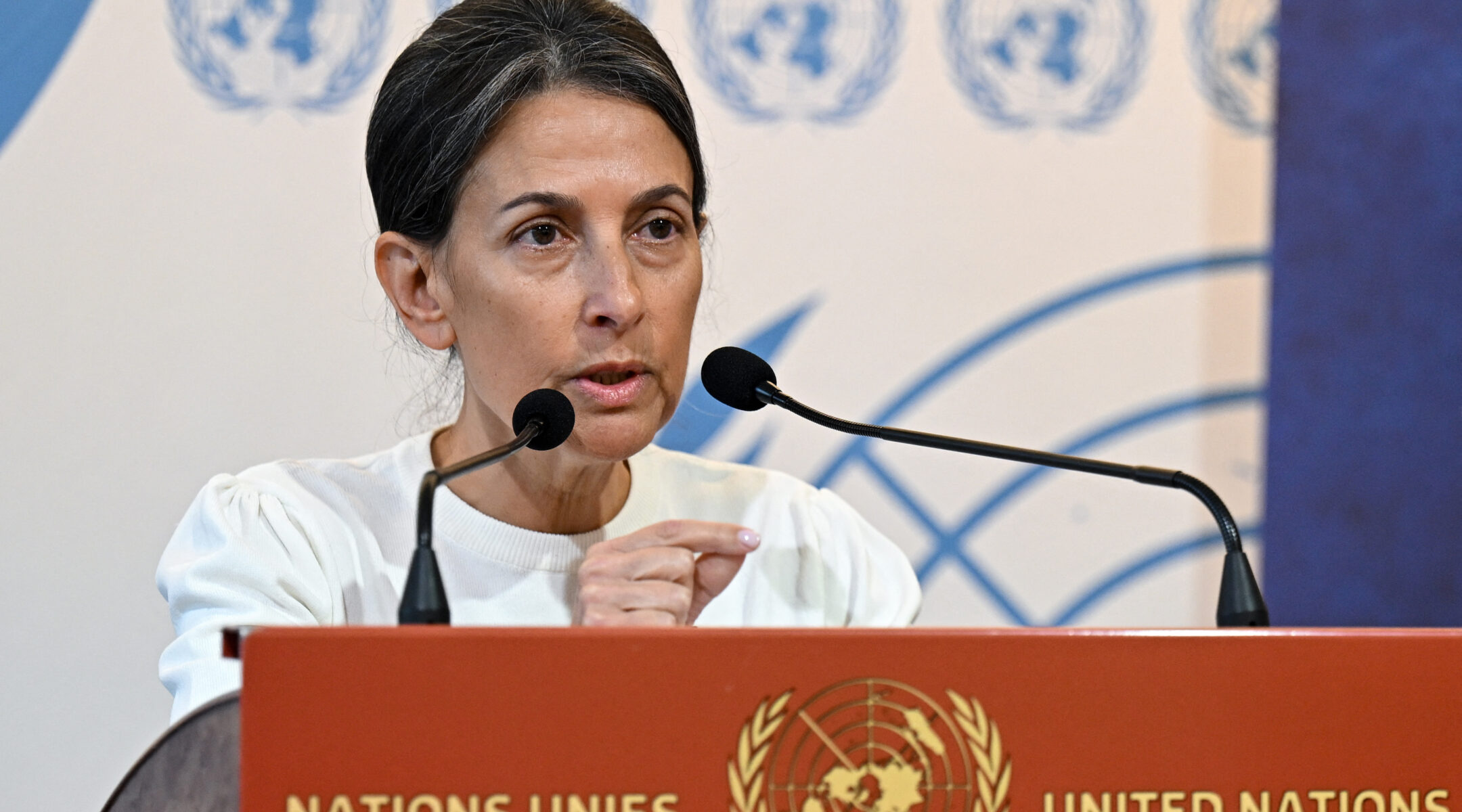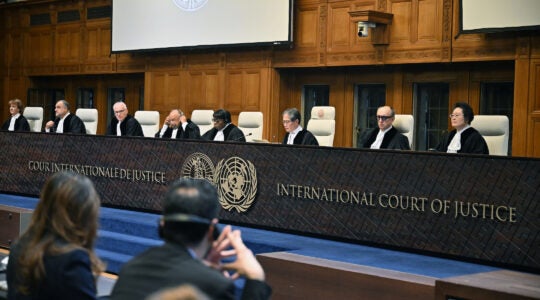(JTA) — Several months ago, before she met with the pope and Elon Musk, before her adopted home was thrust into war by a brutal attack, before she became one of the most prominent faces of a hostage crisis, Rachel Goldberg was desperately looking for luggage.
It was March and hundreds of people had flown to Israel for a study program on which Goldberg, who moved with her family from the United States 15 years ago and lives in Jerusalem. was assisting. People were upset: Suitcases weren’t showing up where they were supposed to.
“Rachel was really on it: making phone calls, calling the hotels, calling the buses, connecting with the people, just comforting them, saying, ‘I’m going to find it, we’re on it,’” recalled Rachel Kaufman, a Jewish educator from Los Angeles who was part of the trip. “I witnessed her crying over people being reunited with their luggage.”
Kaufman thought about that experience when she learned that Goldberg’s son, Hersh Goldberg-Polin, 23, had been taken hostage on Oct. 7 from the music festival he had been attending with a friend. If Goldberg could be so sensitive to the pain of others over something as inconsequential as luggage, how much more deeply must she be feeling her son’s absence?
Goldberg has answered that question every day, sometimes more than a dozen times, since Oct. 7, as she has become one of the most visible advocates, particularly in English, for Israel’s hostages in Gaza. Every morning, she tapes a number to her shirt signifying the number of days since Oct. 7 — Friday was 70 — and then, with a mixture of warmth and sadness and steely determination, spends the rest of her time telling the world about Hersh.
In the New York Times, five days after he was taken, she described Hersh as “gentle and kind and always finding creative ways to improve things and connect with other human beings.” She spoke to CNN’s Anderson Cooper, who was the first to show her video showing that Hersh’s arm had been blown off, but that he was alive when he was loaded onto a Hamas pickup truck and taken to Gaza. She and her husband Jon Polin were featured on the cover of Time magazine.
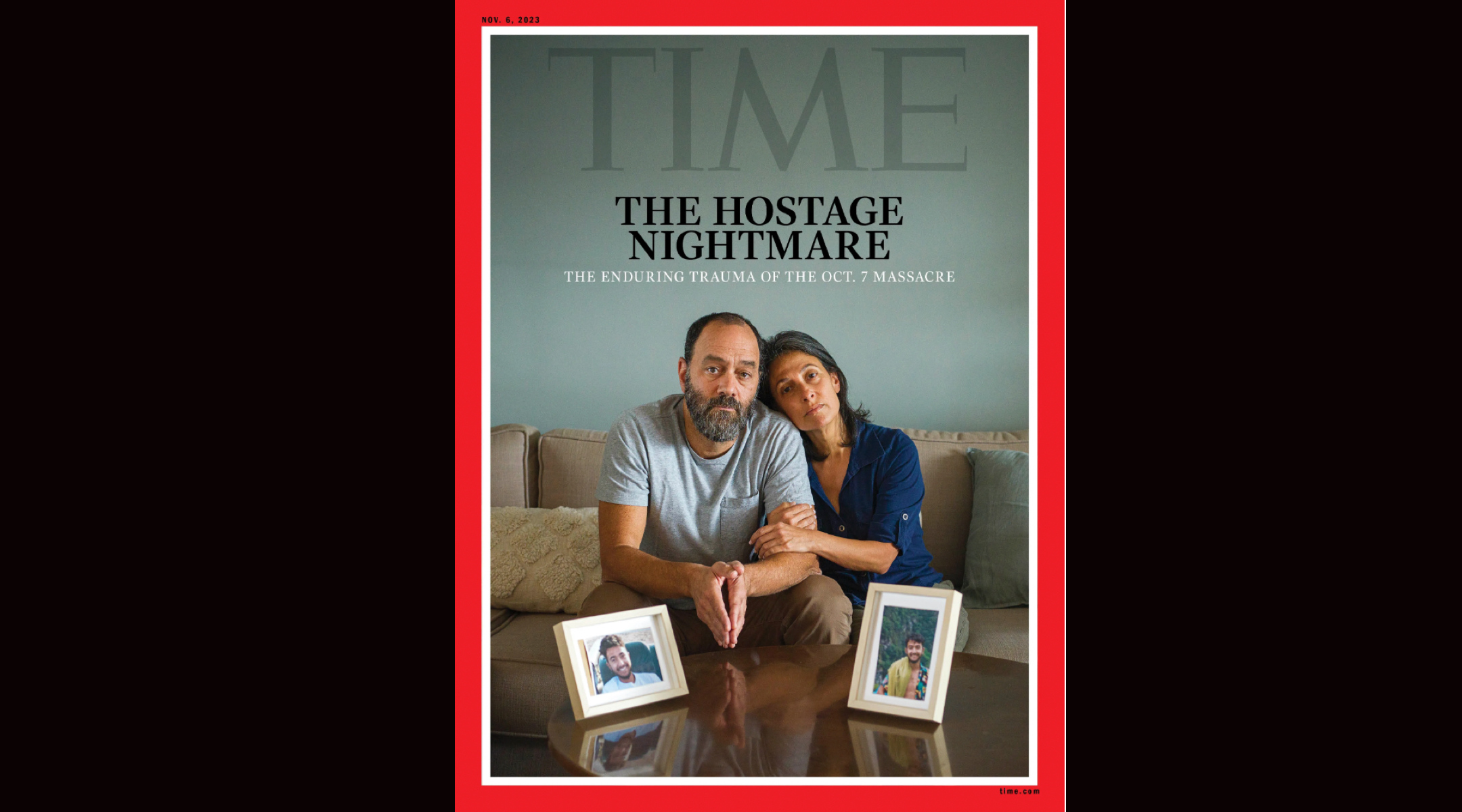
Rachel Goldberg and Jon Polin posed with pictures of their son Hersh on the cover of Time Magazine in November 2023. (Screenshot)
Since Oct. 7, she has addressed hundreds of thousands of U.S. Jews at a march in Washington, D.C.; the pope, whom she visited at the Vatican; and countless others on social media and at rallies in the United States, Israel and beyond.
And yet even as the quest to save her son has fully occupied her for more than two months, Goldberg remembers that moment with the luggage. She recalled in an interview this week that the missing suitcase contained an irreplaceable item, a set of family tefillin. The reunion with its owner came after Goldberg and others gave tzedakah, charity, in the name of a second-century Jewish sage.
“You can ask Rabbi Meir Baal Haness to return anything that is lost and your plea will never go unanswered,” Goldberg said. Tradition holds that the power is especially assured on the first day of the Jewish month of Tevet, which began this week.
“We did that tradition on Rosh Chodesh Tevet for the return of our lost object named Hersh ben Perel Hana veYonatan Shimshon; we gave tzedakah in his name,” Goldberg said, using her son’s traditional Hebrew name. “I am waiting for the return of my beautiful lost object named Hersh.”
Goldberg spoke to the Jewish Telegraphic Agency on Thursday, as Israel tamped down hopes about a truce deal that could allow the release of additional hostages and as news emerged about the deaths of three hostages in captivity. It was one day before Israel killed three hostages in Gaza after mistaking them for Hamas terrorists.
This interview has been lightly edited for length and clarity.
JTA: It’s been 69 days since Hersh was captured. How are you and your family doing now?
Goldberg: It’s not describable how any of us are doing to people who haven’t been through it. Thank God not many people have been through what we, the hostage families, are going through. We get up every morning and we have to pretend to be people. Because in order to save them we have to function. And in order to function, you have to pretend to be a person. So that’s what we do. But for me, I feel like 69 days ago, someone tore my heart out and took it away. I’m walking through this life in this very artificial way. Just trying to do the best that I can so that I can function enough to be able to be productive in trying to save my son’s life.
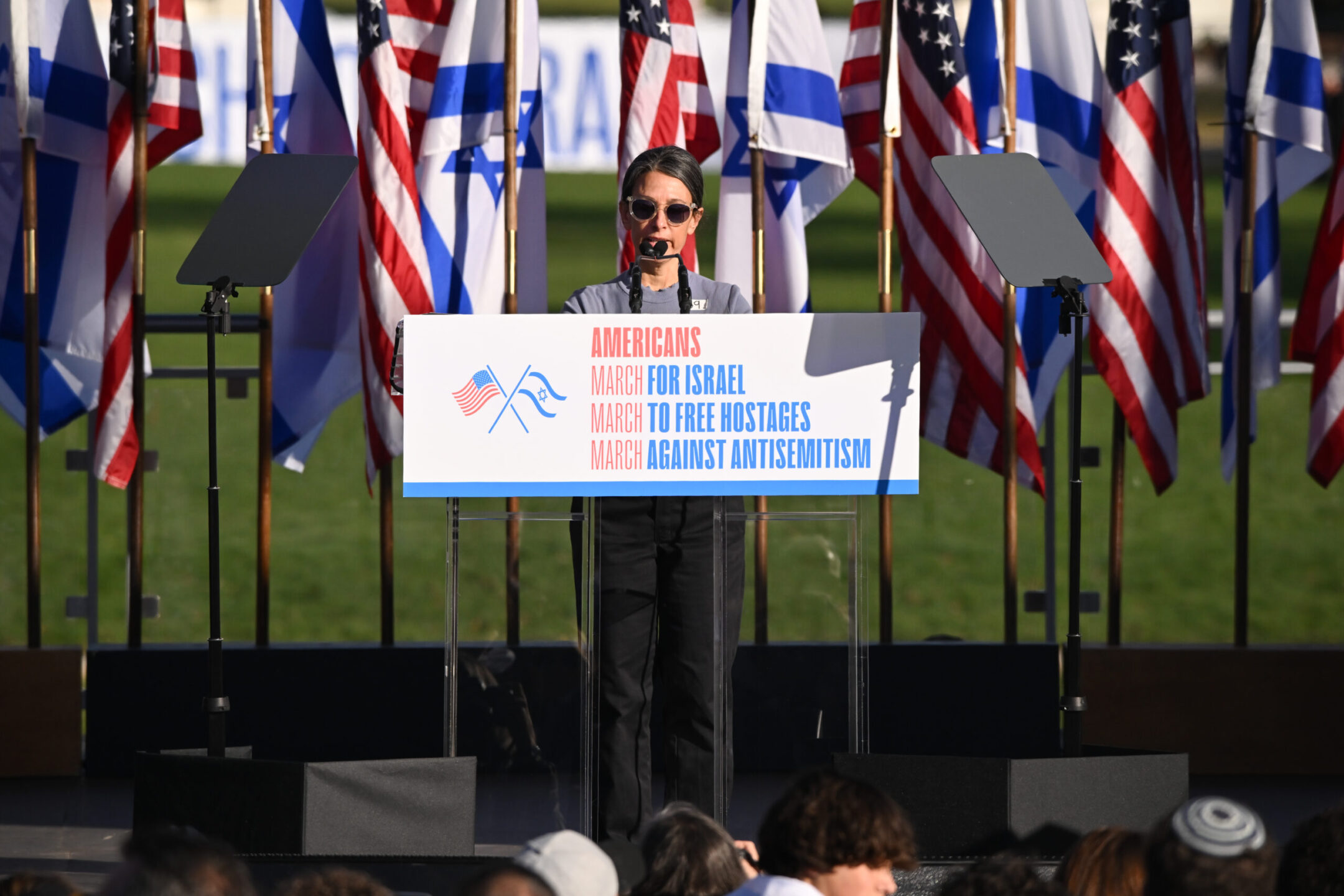
Rachel Goldberg speaks during the “March For Israel” at the National Mall in Washington, D.C., Nov. 14, 2023. (Photo by Noam Galai/Getty Images)
You’ve become this huge inspiration for people all over the world, especially for women. How does that sit with you?
I think that a lot of people try very hard to empathize or sympathize with us. And that’s what speaks to them. This story is very universal, people right away can say, what if that was my son, my daughter, my mother, my husband, and people right away, connect with the suffering that we’re going through. And we appreciate it. We appreciate that people from all over the world have reached out to us people from all different religions and all different backgrounds. And it is helpful during this time when, when it’s sometimes a struggle to get through the next hour, sometimes it’s a struggle to get through the next 15 minutes and sometimes there’s just like a moment where it’s unbearable. So all of that support — we feel it and we appreciate it.
Can you speak a little more about those moments of struggle? Where does your mind go? What happens? How do you get out of it?
From the very first day, it’s been a slow-motion terror. You know sometimes you get a fright when you come around a corner and you didn’t know someone was there and you have that moment where you jump back and you’re like, oh my gosh, and your heart is pumping in your chest. I didn’t know it was sustainable. But it has been endless.
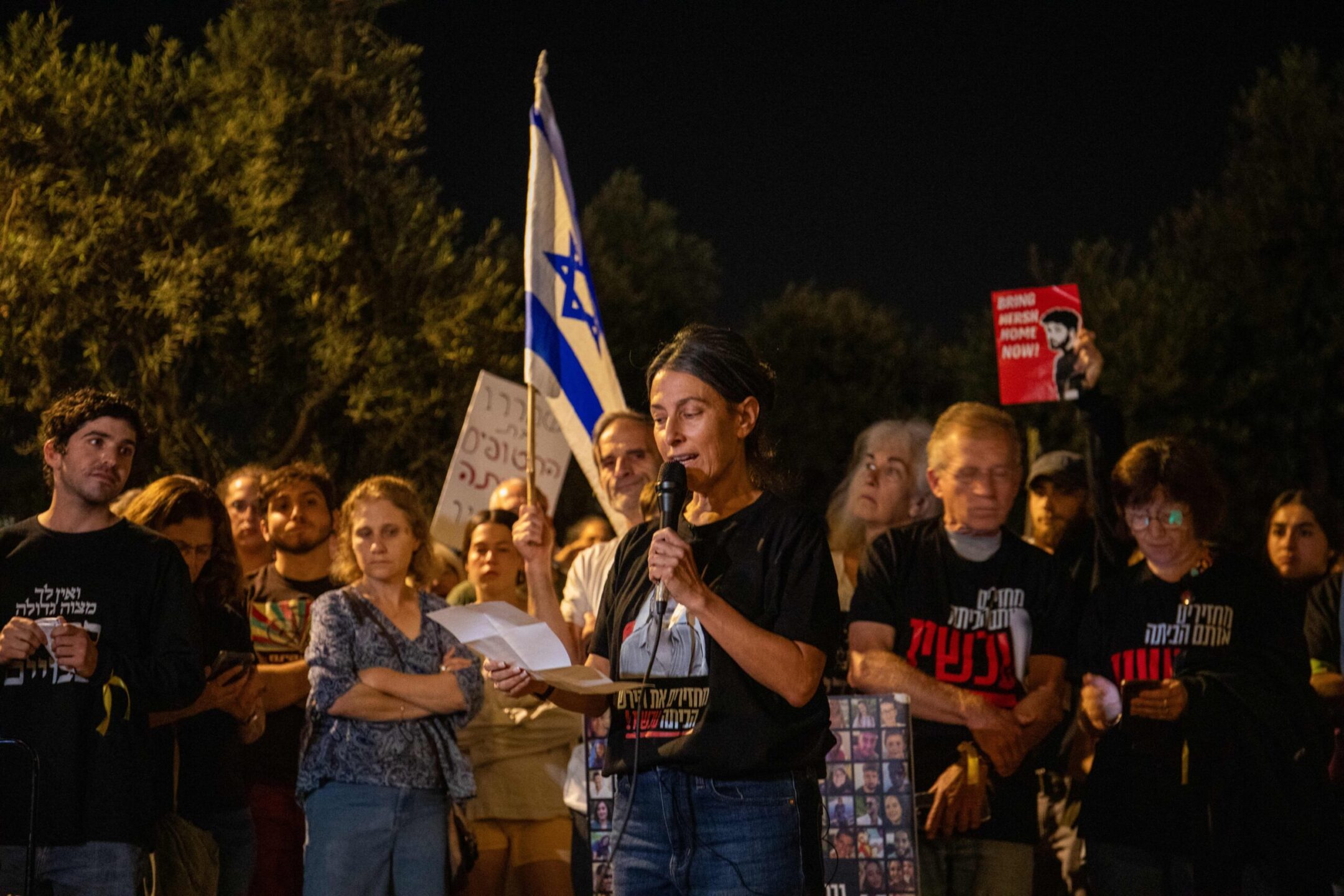
Rachel Goldberg, the mother of Hersh Goldberg-Polin, 23, who was kidnapped to Gaza, speaks at a rally for the return of the hostages in Jerusalem, Nov. 4, 2023.(Yahel Gazit/Middle East Images/AFP via Getty Images)
People who hug me — and I don’t really like that, necessarily, at this time — everybody comments, “Oh my god, your heart is beating out of your chest.” Everyone who comes chest to chest with me can feel it. It’s a constant. Before this, I used to be very active. I used to exercise every day except Shabbat. Now, I haven’t done a thing in 69 days, but my heart is racing like a rabbit at all times. So it’s being in a state of constant fear. Which is hard to manage. And that’s just what all of us are going through.
And I think what really made it much worse was last Tuesday when the war cabinet had a session where they had hostage families. Hearing the testimony from the released hostages made it so that everyone went into anguished panic on overdrive of hearing about the torture, the starvation, the conditions, the trauma that the hostages are going through that, when we think about that, it’s almost truly unendurable. All of this has been unendurable so it’s like another level of excruciation.
Do you know anything about the conditions he’s in?
To be honest, I try not to think about how he’s being held. It’s not helpful to me and it’s not helpful to him. Because if I’m devastated, if I’m terrified, I can’t be as high-functioning and as effective as I am. I’m praying for him all day long. And in my quiet moments, I’m always talking to him and I’m always saying the mantra, I love you, stay strong, survive. I love you, stay strong, survive. I’m always singing the different songs that we would sing. That helps me get through.
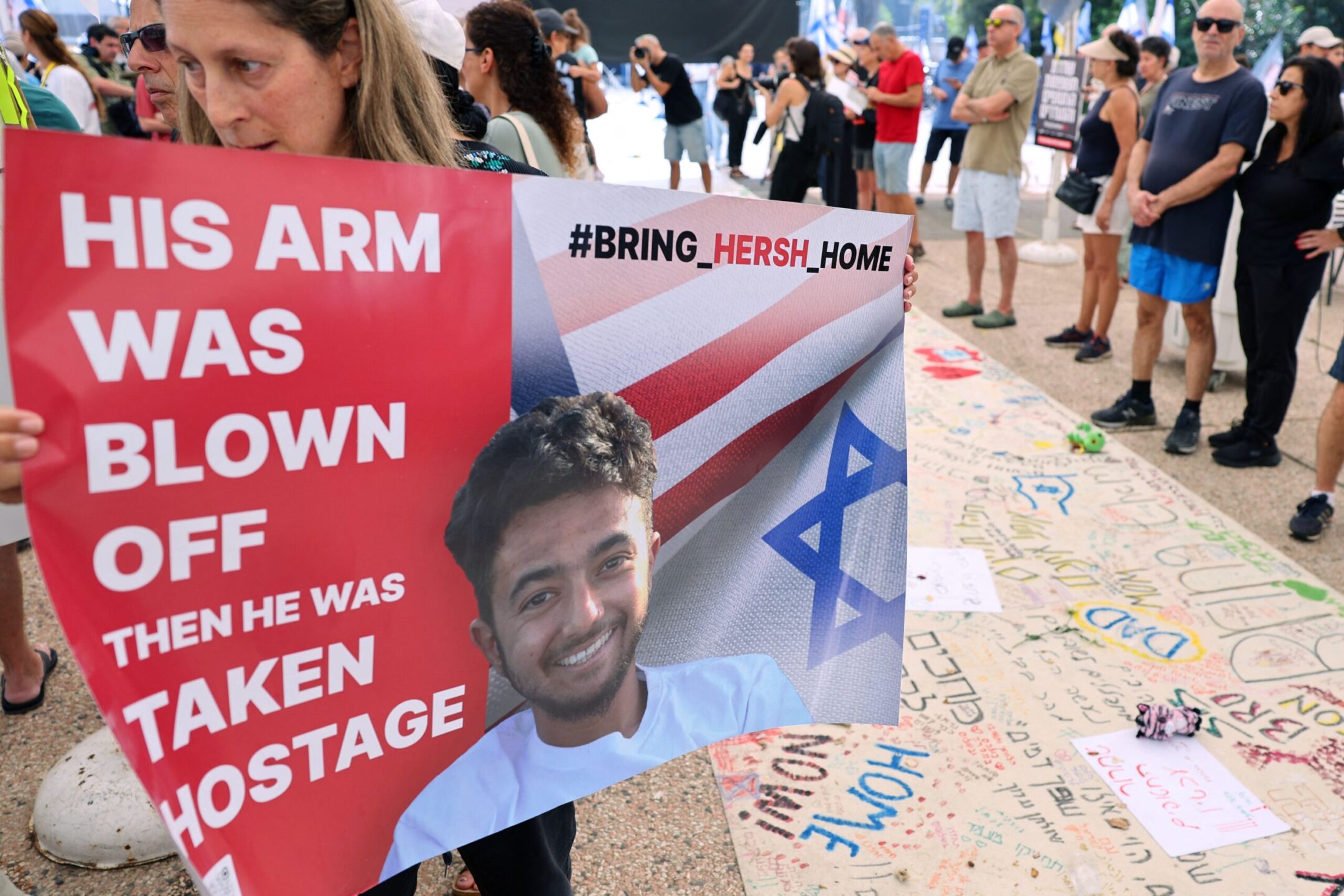
A protester holds a poster with a photo of 23-year-old U.S.-Israeli Hersh Goldberg-Polin as people gather with signs calling for the release of hostages held by Hamas since Oct. 7, during a rally in Tel Aviv, October 28, 2023. (Jack Guez/AFP via Getty Images)
It’s Hanukkah now. If you had to paint an ideal picture of next Hanukkah, how would that look?
Oh, gosh, well, I would love for him to come home really soon and have the time to recover in every way, to get the treatment he would need in every way, not just a new arm but all the trauma, emotional and psychological and spiritual trauma, that all of these hostages have been going through. I’d love for him to get every single thing he needs and I would love for him to be on his trip next Hanukkah. He has a ticket in a couple of weeks on December 27 for India and he was going to be traveling for one to two years around the world, which he’s been planning and dreaming of since he was in first grade with detailed maps and detailed plans, by himself. So I certainly hope that he’ll be able to take that trip and you know what, you don’t need two arms to travel the world.
What would you like Israel to be doing right now?
I thought that what happened two weeks ago with the pause was an excellent framework to return to. The people in Gaza are suffering horribly. The Gazan civilians are suffering horribly, in every way. I thought having humanitarian aid let in for them was crucial. Getting some of our hostages out was crucial. And even though those negotiations were held together by a very thin, fragile thread, they were successful. They showed us that we have the ability to do that — everyone at that table had the ability to execute that, and all sides benefited. I would love to see that happen again.
How did you react to the reports that the war cabinet stopped the head of the Mossad David Barnea from traveling to Qatar to negotiate another hostage deal?
We were devastated. We’re feeling such despair. Despair that, to be honest, I don’t know that anyone in the war cabinet can really picture because I don’t think that anybody who hasn’t been in our shoes can really truly feel the agony that we are experiencing.
We have to be open to just hearing what’s out there. We have to be open to just sitting at the table. That’s why we elect leaders so that they could be our representatives — in good and bad. We know that our loved ones are being held in brutal conditions. We now have heard from the hostages who were released that there’s torture, starvation and there’s bombing going on. Time is completely not on our side. So to hear that our cabinet didn’t want to just even entertain hearing an option is, for all of us who think that each hour is another hour that maybe our loved one is actually dying, is devastating. It is terrifying for all of us.
There have been reports that Egypt has been approached to possibly broker a hostage negotiation. What are your thoughts on that?
I would love for something like that to happen. I think Egyptians have always been right there trying to help and are very reliable partners, actually. So I would love to see Egypt be more involved. Qatar has been obviously a really helpful partner during this time. At the end of the day, I’m not a politician. I’m not a military strategist. I am a mom of a civilian who was taken in a very aggressive way from a very neutral place from a music festival. And I want him back.
In your quest, you’ve met and spoken with some of the most influential people: the pope, Elon Musk and President Biden. What has that been like?
I felt very lucky and privileged to get to meet the pope. He’s such a meaningful, influential figure in the world, not just to Catholics. I’ve been feeling this really painful approach to humanity since October 7, this feeling that humans had failed. We have this cognitive dissonance between who we think humans are and who we really are and I was really losing my hope in humanity. He was the one who actually said to me, ‘What you have all been through is true terrorism, and terrorism is the lack of humanity.’ And all of a sudden, it was like I had this switch where I realized, Oh, OK, so what we’ve experienced was the lack of humanity. It wasn’t that humans aren’t good. It’s that this was a moment where humanity wasn’t present.
I found him to be very comforting and I thought he was also very fair that when we left 15 minutes later, he had a group of Palestinians come in, and I think that that’s important.
President Biden and [U.S. Secretary of State] Anthony Blinken have both been from the very first week in touch with us and been not just sympathetic and not just empathetic, but very much anguished and motivated to try their best. We feel that.
With Elon Musk, first of all, you have to understand that I haven’t watched news in 69 days. I respect that he took the time to come here. He said, I want to understand what is happening. Because he was seeing one side. I understand that the world sees all these horrible images coming out of Gaza. They are horrible. I also feel tremendous pain and anguish seeing those images of innocent children in rubble. When he was here, Elon Musk saw the 47-minute reel [that Israel produced of Oct. 7 footage]. Most of those images were taken by Hamas themselves. It was very powerful for him.
I showed him that video of Hersh with his arm blown off getting loaded onto that truck at gunpoint. He seemed very moved and very concerned and listened to everyone’s stories.
I’m asked to speak in different places where I would never have been speaking before and I just wonder if it’s helping, if it’s doing anything in the world. If it’s helping the hostages, if it’s helping Hersh. I have no idea.
On that point, you’ve said in an interview that you go to bed at night and think this is like the myth of Sisyphus. Is there a point where you say, well, I’m not going to push this rock up the hill anymore?
It hasn’t happened yet. And I do wonder to myself is there going to be a day where I wake up and say, forget it. I don’t think so. Because I think this is such a finely motivated instinct of saving my child. So much of this is like an animalistic, primal, innate response to danger of my offspring. I do wake up each morning and I say this prayer that is traditional to say before you get out of bed. And I say, ‘OK, Hersh, stay strong, survive, I’m going to get you.’ And I get out of bed and do it all again. Often I’ll say to myself, stay strong, survive, because I need to have the strength to keep fighting. It’s like a marathon that never ends, but it’s a marathon. Actually, Ruby [Chen], one of the other hostages’ dad, said it’s a marathon you have to sprint through. It’s like the worst of both types of endurance test.
How do you draw strength from your faith? Do you have moments of total despair? I’ve witnessed some of the family members of other hostages screaming at God.
Oh yes. But that’s part of a relationship with God. So I actually think it’s really healthy. When I’m screaming at God, it shows I believe in this idea of God. If I didn’t, then I wouldn’t be screaming. I pray every day. I’ve been doing this for years, that predates October 7. I definitely am calling out when I’m praying, I’m praying like this [gestures skyward]. My hands are up in the air. I am in dialogue. I am definitely shouting and I think that that is a sign of a relationship. I say Psalms all day and some of them are just so relevant in terms of saying, ‘Stop turning your face away from me. I want you to answer me now.’ It’s real desperation. And that’s relevant.
There’s the Psalm about the joy that we’re going to experience when the captives return to Zion, which is just beautiful and relevant and so spot on. And there’s ones where David is calling out from inside the darkness of the cave, saying, get me out of here. And when I say that, I say I’m saying it in the name of my son, and I say it for him as if it’s him calling up from the darkness of the cave. I draw tremendous strength from that.
I think it’d be much harder if I didn’t have my faith as a crutch to help me through this.
What have you learned about yourself, and about your husband Jon and your daughters during all this, and also about Hersh?
About Jon, I thank God he’s my partner. He’s just an unbelievable fighter. smart, creative, sharp. Relentless. I don’t know what other partner I could get through this with. And we’re so respectful of each other through this time of excruciating tribulation. I actually have been impressed with the [girls’] resilience.
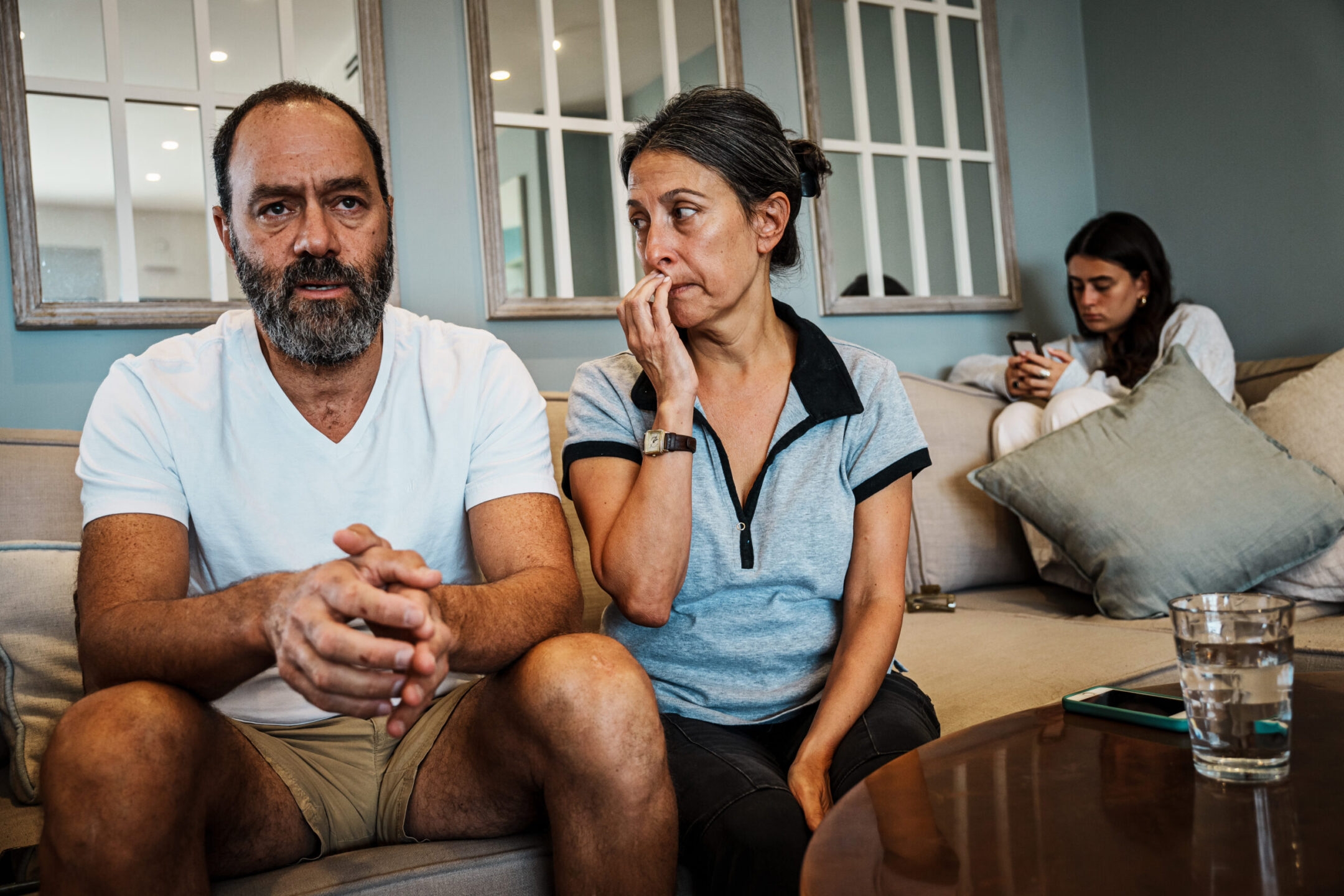
Jonathan Polin, 53, from left, Rachel Goldberg, 53, recount their last interactions with their missing son Hersh Goldberg-Polin, 23, who went missing after Hamas launched a surprise attack and breached Israeli borders, taking hostages, while family members and friends show up to support them at their home in Jerusalem, Oct. 10, 2023. (Marcus Yam / Los Angeles Times via Getty Images)
About myself: I never would have thought I could have endured what I’ve been enduring. Never. I’m not a particularly strong person pre-October 7, and I’m a really emotional person. I was the one who would cry during the Kodak commercial. Of course I have a lot of emotional times now, but I’m walking one foot in front of the other and trying to do what I need to do so that you can save them before it’s too late.
About Hersh — what’s so interesting to me, and I think about it a lot, is that my love for him has continued to grow and develop in his absence. Which makes sense, but it’s not something I was ever aware of before, when he traveled or when he went to camp or whatever it is. I was never cognizant of that before. Now, I’m so much more aware when I wake up. It’s like, I love him more than I did yesterday. And the relationship that I have with him is still developing. I’m aware of that and maybe part of that is because I’m talking to him a lot more because I talk to him all day long.
When I was in Rome, after meeting the pope, I was sitting in a room and they don’t really speak a lot of English there. So there was a room filled with a lot of Italian and I was sitting there and someone said, ‘You seem so calm, like you’ve been sitting here for 20 minutes, you haven’t moved,’ and I thought, I’ve been talking to Hersh this whole time.
Is there something that you feel that you need from the world right now? And American Jews specifically?
We have felt tremendous support from the American Jewish population. The truth is, we felt that from the Jewish community all over the world.
I think that calling every single day to the White House is still critical, critical, critical. And people can also call their local elected officials if that’s what they prefer. We have this website One Min A Day which makes it super easy, you can just click in your zip code, and it will show you your local elected officials. If you prefer to send a text you can. I think calling is more important. We do have a text for people to use if they’re not comfortable winging it, but it’s a 20-second message: “Hi, it’s day 69. We still have eight Americans in Gaza. Unacceptable. And 122 others.” I do think that everyone can call every single day. First of all, you can feel when you go through the day that you have done something and I think in helpless situations in life, to know that even if it’s just one minute, but you’ve done something, and it’s a minute and you did it and it’s doable, and it’s ritualized. Just do it when you first get up or whatever it is. So I think that’s really important.
I think that trying to universalize the message of the hostages is something we’re trying to really push. These are not just Israeli Jews being held. These are people from many different nations. The [hostage] who has diabetes and needs his meds — he may not even still be alive. He’s a Muslim Arab. That should be hanging outside of a synagogue, or a mosque or a church. It shouldn’t be a Jewish issue. This is a human issue, and we need to universalize the hostage situation in order to get that to stay on people’s minds.
But even the situation of the hostages became politicized, as you know, with posters being torn down. And now the international community’s attitude towards Israel is shifting as the numbers of deaths rise in Gaza. What are your reflections on that?
I understand that. I understand that when thousands of civilians are being killed, the world is not going to be comfortable with that. I’m not comfortable with that. I don’t think anyone here is comfortable with that. These are not intended outcomes. And this is what I talked about at the UN and in New York. The terrible thing about any war is that we know that the people who suffer the most are the innocent, are the civilians. I understand the frustration. I feel that, too.
In your speech to the United Nations this week, you mentioned a poem you wrote to a Gazan woman called “One Tiny Seed.” Can you tell us more about that?
I don’t sleep a lot anymore. In the middle of the night, I often write — I’ve never been a writer, and I’m not a great writer. But I find that I can kind of write poetry because it’s more forgiving. I don’t even know if that was a poem. It was a musing.
I think we’re just going to have to take a lot of risks if we want to have any sort of future in this world. Our weapons are so sophisticated, our danger level is so sophisticated, the anger is so ingrained. Pain is so deep. And we’re going to have to make a real choice to decide, do we want to figure out how we live together and it will be scary, and it will require giving up on things that we hold to be very dear to us in order to live, or are we going to say, OK, you know what, we’re not willing and this is the beginning of the end. I think we’re just really at a crossroads.
I know there must be a woman in Gaza, who’s just like me, who has a son just like mine, and I pray that she’s taking care of my son. And I know there are women in Gaza who are exactly my age and look just like me and have kids just like mine. And you know, I really was speaking to that woman saying, can we take bigger chances together, even though that tiny seed would be wrapped in so much pain and so much fear.
There was talk about some of the hostages in need of urgent medical care being released. Has anyone talked to you about that?
We totally agreed that women and children and babies should certainly have been released first so that was not an issue for us. We know that there were some families [of hostages] who felt very strongly that you don’t do “selectzia” [selection] and that people are people and it shouldn’t matter. We didn’t feel that for whatever reason. I’m not faulting them. We did say at some point we do think that the critically maimed, wounded should [be prioritized]. Hersh will be disabled for the rest of his life. He will, God willing, come home and he will live the rest of his life without an arm and it’s his dominant arm. I’m sure it is tremendously difficult for him because we don’t know what kind of treatment if any, he had, I don’t know what kind of antibiotics if any, he has, I’m sure he’s getting no pain medication. There’s no clean water. A lot of the hostages released said that in the 50 days of captivity, they never once took a shower. So you can imagine as a mother thinking of this child who has an explosive amputation of a limb, not having access to having it cleaned, is terrifying.
We definitely hope and pray that if there was any talk of releasing people who are in a humanitarian, critically wounded condition — irrespective of their age — we would like that as one huge category.
Thank you for speaking to me. I pray that we’ll see Hersh and the others home soon.
Please keep praying, we really believe in it. You know what, you can talk to him too. The more people that are talking to him, I think he’ll hear. Who knows which of us he can hear?
JTA has documented Jewish history in real-time for over a century. Keep our journalism strong by joining us in supporting independent, award-winning reporting.
